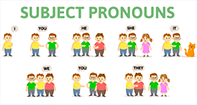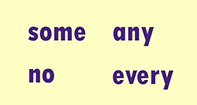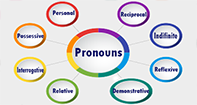Change Avatar
Types of Pronouns
Types of Pronouns
Personal pronoun
Personal pronouns are a special kind of pronoun that refer specifically to people, places, or things.
Examples: I, we, you, he, she, you, they, it
Possessive pronoun
Possessive pronouns show ownership or property of someone or something.
Examples: I told you the blue shirt is mine.
Interrogative pronoun
Interrogative pronouns are a special type of pronouns that help you to ask questions.
Examples:
Where are you going?
What’s your name?
Relative pronoun
A relative pronoun is a specific type of pronoun that is used to link together related clauses.
Examples:
It was my brother who caused the damage.
This is the teacher whose students love her the best.
Distributive Pronoun
A pronoun that describes whether things on persons are mentioned collectively or separately. These pronouns demand single work in one time. They are as under No one, Each, Either Neither
Demonstrative pronoun
Demonstrative pronouns are a special type of pronoun that replace nouns to indicate location in distance or time.
Examples:
This smells incredible.
These are fantastically designed.
Reflexive pronoun
Reflexive pronouns are a specific type of pronoun that is used as an object within a sentence. They indicate you’re talking about yourself.
Examples: Myself, Yourself, Himself, Itself, Herself
Indefinite pronoun
They are used to represent an indefinite noun or pronoun, ones that do not refer to any specific person, place, or thing.
Examples:Somebody, anybody, nobody, everybody
Emphatic Pronoun
These are like reflexive pronouns but somehow different from reflexive pronouns. They use to show stress and emphasis in a sentence. Emphatic pronouns are used just after the subject.
Examples: Ourselves, themselves himself etc.
Exclamatory Pronoun
A pronoun that is used to express wonder or Surprise is called an exclamatory pronoun For example, what and how.
Examples: of Exclamatory Pronoun in Sentences
What a lovely pictures
How beautiful the pen is
Quantifier Pronoun
The quantifier pronouns are used to show the quantity of something. Some Quantifier pronouns are less, much, little, low, more, never, few etc.
Reciprocal pronoun
They indicate that two or more nouns are doing or being the same to one another in a mutual relationship.
Examples:
My brother and sister love each other.
The Olympians congratulated one another on each winning a medal.










